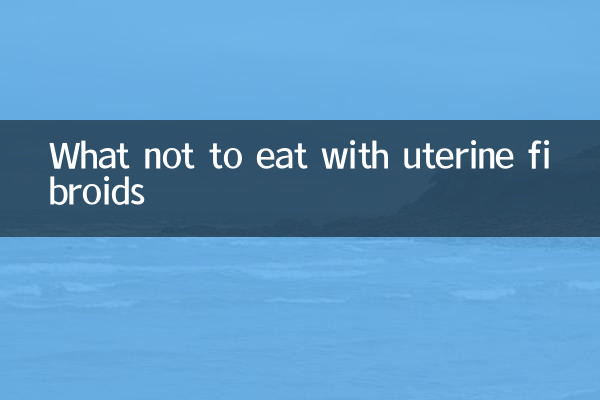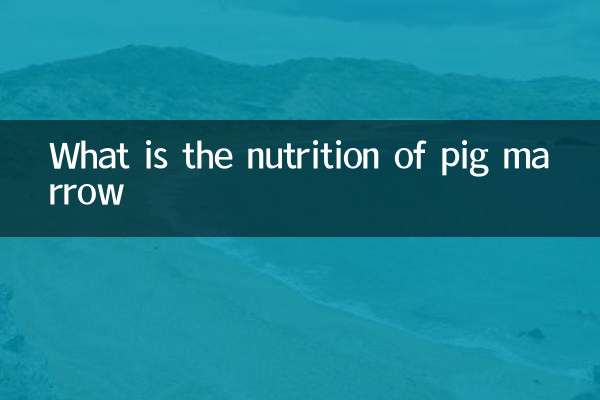What not to eat with uterine fibroids
Uterine fibroids are one of the common benign tumors in women, and their occurrence is closely related to dietary habits. A proper diet can help control the growth of fibroids, while an improper diet may worsen the condition. This article will combine the hot topics and hot content on the Internet in the past 10 days to provide you with a detailed analysis of the foods that patients with uterine fibroids should not eat and provide scientific advice.
1. Foods that patients with uterine fibroids should avoid

Here are the foods patients with uterine fibroids should avoid and why:
| food category | specific food | unsuitable reason |
|---|---|---|
| high fat food | Fried food, fatty meat, butter | High-fat foods may increase estrogen secretion and stimulate fibroid growth |
| High sugar foods | Cakes, candies, sugary drinks | High-sugar diets may lead to obesity and increase estrogen levels |
| red meat | Beef, mutton, pork | Saturated fat in red meat may worsen inflammation |
| Foods containing hormones | Fast-growing chicken, hormone-containing milk | Exogenous hormones may stimulate fibroid growth |
| Alcohol | Beer, liquor, red wine | Alcohol may interfere with the liver's ability to metabolize estrogen |
| caffeine | Coffee, strong tea, chocolate | Caffeine may worsen pelvic congestion symptoms |
2. Controversial foods that have been hotly discussed recently
According to hot discussions on the Internet in the past 10 days, there is considerable controversy as to whether the following foods are suitable for patients with uterine fibroids:
| controversial food | support point of view | Opposing views |
|---|---|---|
| soy products | Contains phytoestrogens, which may regulate hormone balance | Phytoestrogens may stimulate fibroid growth |
| dairy products | Provide calcium to prevent osteoporosis | Commercial dairy products may contain growth hormones |
| spicy food | Promote blood circulation | May worsen pelvic congestion symptoms |
3. Recommended diet for patients with uterine fibroids
In addition to avoiding the above foods, patients with uterine fibroids should consume more of the following beneficial foods:
| food category | Recommended food | benefit |
|---|---|---|
| vegetable | Broccoli, spinach, carrots | Rich in antioxidants and fiber |
| fruit | Apples, blueberries, citrus | Provides vitamins and minerals |
| whole grains | Oats, brown rice, whole wheat bread | Help regulate blood sugar and hormone levels |
| High quality protein | fish, legumes, nuts | Provides essential amino acids |
4. Hot topics about diet for uterine fibroids in the past 10 days
1."Are phytoestrogens safe?": Recently, many nutritionists have debated on social media about the impact of soy products on uterine fibroids, forming two distinct opinions.
2."Ketogenic Diet and Uterine Fibroids": A health blogger shared a case of ketogenic diet improving symptoms of uterine fibroids, which triggered widespread discussion and expert doubts.
3."Superfood List": Anti-inflammatory food combinations recommended by many gynecologists, including turmeric, olive oil, etc., have become a hot topic recently.
4."Fast Therapy": The debate over whether intermittent fasting can help control fibroid growth continues to heat up, and experts recommend trying it with caution.
5. Expert advice
1. Individualized diet plan: Each patient’s physical condition and fibroid characteristics are different. It is recommended to consult a professional doctor to develop a personalized diet plan.
2. Regular monitoring: After dietary adjustment, regular reexaminations should be made to observe changes in fibroids.
3. Comprehensive conditioning: Diet is only one aspect of uterine fibroid management. It also needs to be combined with appropriate exercise, stress management and regular work and rest.
4. Scientific attitude: Maintain a rational judgment on various "magic cures" on the Internet and avoid blindly following the trend.
Conclusion
Dietary management of uterine fibroids is a process that requires long-term persistence. By avoiding irritating foods, increasing the intake of beneficial nutrients, and cooperating with medical guidance and regular examinations, the development of fibroids can be effectively controlled. Various dietary methods that have been hotly discussed on the Internet recently should be chosen scientifically based on your own situation, and do not try blindly. Remember, healthy eating habits not only help manage uterine fibroids, but are also the basis for preventing many gynecological diseases.

check the details

check the details